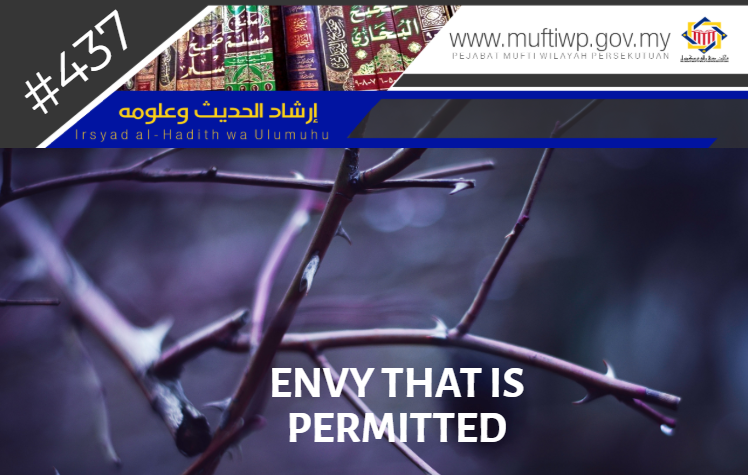
Question:
I once heard there is a hadith which categorized envy into several categories and there is a category that is permitted in syarak. Can SS Mufti state the hadith and explained about it?
Answer:
Alhamdulillah, praise and thanks to Allah for the countless blessings He has blessed us all with. Blessings and salutations to the Prophet Muhammad PBUH, his wives, his family, companions and all those that follow his teachings to the day of judgement.
Envy is a prohibited attribute in Islam and Allah SWT commanded us to seek protection from Allah SWT from the evils of envy. Allah ‘Azza wa Jalla state:
وَمِن شَرِّ حَاسِدٍ إِذَا حَسَدَ
“And from the evil of an envier when he envies."
Surah al-Falaq (5)
The Prophet PBUH said:
إِيَّاكُمْ وَالْحَسَدَ فَإِنَّ الْحَسَدَ يَأْكُلُ الْحَسَنَاتِ كَمَا تَأْكُلُ النَّارُ الْحَطَبَ
“Avoid envy, for envy devours good deeds just as fire devours firewood.”
Sunan Abi Dawud (4903)
However, there is a hadith that state an exception in being envy or jealous. The Prophet PBUH said:
لاَ حَسَدَ إِلاَّ فِي اثْنَتَيْنِ رَجُلٌ آتَاهُ اللَّهُ مَالاً فَسُلِّطَ عَلَى هَلَكَتِهِ فِي الْحَقِّ، وَرَجُلٌ آتَاهُ اللَّهُ الْحِكْمَةَ، فَهْوَ يَقْضِي بِهَا وَيُعَلِّمُهَا
"Do not wish to be like anyone except in two cases. (The first is) A person, whom Allah has given wealth and he spends it righteously; (the second is) the one whom Allah has given wisdom (the Holy Qur'an) and he acts according to it and teaches it to others."
Sahih al-Bukhari (73)
There is also another narration which states:
لاَ حَسَدَ إِلاَّ فِي اثْنَتَيْنِ رَجُلٌ آتَاهُ اللَّهُ الْقُرْآنَ فَهُوَ يَقُومُ بِهِ آنَاءَ اللَّيْلِ وَآنَاءَ النَّهَارِ وَرَجُلٌ آتَاهُ اللَّهُ مَالاً فَهُوَ يُنْفِقُهُ آنَاءَ اللَّيْلِ وَآنَاءَ النَّهَارِ
"Not to wish to be the like of except the like of two (persons): a man whom Allah has given the knowledge of the Qur'an and he recites it during the hours of the night and the hours of the day; and a man whom Allah has given wealth and he spends it (in Allah's Cause) during the hours of the night and during the hours of the day."
Sahih al-Bukhari (7529) and Sahih Muslim (815)
According to Imam Hajar al-‘Asqalani, the term envy in the hadith actually means al-ghibtoh (الغبطة) which is our desire or want to receive the blessing just like of another person, without wanting the blessing from being taken away from the said person and the term hasad (envy) is used metaphorically. This desire is also said as competition (munafasah) and is a good attribute if it involves matters of obedience. (Refer Fath al-Bari 1/167)
According to Syeikh Badruddin al-‘Aini, Imam al-Bukhari exclude the term hasad (envy) from its literal meaning to its metaphorical meaning and thus, this is the reason Imam al-Bukhari placed the hadith under the title al-I’tibat fi al-Ilm wa al-Hikmah (the desire to attain the blessing of knowledge and wisdom). (Refer ‘Umdah al-Qari Syarh Sahih al-Bukhari 2/56)
Conclusion
To conclude, feelings of envy is basically prohibited, as clearly stated through the verses of the Quran and hadith stated above.
As for envy which is permissible is only for good things, and it is basically not described as hasad, but as desire/wants (ghibtoh/raghbah) to be blessed with the same blessings, so that we could increase our worships that could drive us closer to Allah SWT and not with any desire that the blessing will be taken away from another.
Wallahua’lam.

